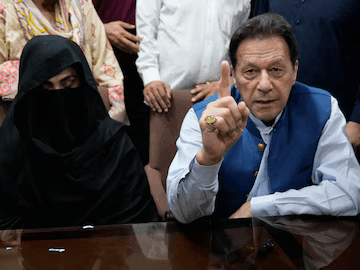In a dramatic turn of events that has further polarized Pakistan’s political landscape, former Prime Minister Imran Khan was sentenced to 14 years in prison, while his wife, Bushra Bibi, received a seven-year sentence. The couple was convicted in the Al-Qadir Trust corruption case, a decision that has sent shockwaves across the nation and ignited debates over the fairness of the judiciary and the political motivations behind the verdict.
What Led to the Convictions?
The Al-Qadir Trust case revolves around allegations that Imran Khan and Bushra Bibi misused their positions to accept undue favors from real estate tycoon Malik Riaz. Specifically, the accusations claim that during Imran Khan’s tenure as Prime Minister, the couple received land in exchange for laundering £190 million returned to Pakistan by the UK’s National Crime Agency (NCA) in 2022.
The funds were intended for the state but allegedly ended up benefitting private individuals through the Al-Qadir Trust, a charitable organization controlled by Imran Khan and his wife. Prosecutors argued that this arrangement violated anti-corruption laws and constituted a serious abuse of power.
Khan’s Defense: Political Vendetta or Legitimate Case?
Imran Khan has vehemently denied the charges, describing them as politically motivated and part of a broader scheme to undermine his political party, Pakistan Tehreek-e-Insaf (PTI). In multiple statements, Imran Khan argued that the judiciary is being used as a tool to stifle dissent and eliminate him from the political arena ahead of Pakistan’s upcoming elections.
His wife, Bushra Bibi, echoed these sentiments, stating that the case lacked credible evidence and that their convictions were based on “fabricated narratives” designed to appease political opponents. Their legal team has already announced plans to appeal the decision, citing procedural irregularities and insufficient evidence presented during the trial.
Public and Political Reactions
The verdict has sparked outrage among Imran Khan’s supporters, many of whom believe the case is part of a larger conspiracy orchestrated by the ruling coalition to silence one of Pakistan’s most influential political figures. Protests erupted in major cities, with PTI activists clashing with law enforcement and demanding Imran Khan’s immediate release.
The ruling coalition, led by the Pakistan Muslim League-Nawaz (PML-N), has defended the convictions as a necessary step to uphold the rule of law. Senior leaders argue that Khan’s tenure was marred by corruption and that his actions have had long-lasting consequences for Pakistan’s economy and governance.
Key Questions Surrounding the Convictions
- Is the Judiciary Truly Independent?
Critics argue that Pakistan’s judiciary has a history of being influenced by political forces, raising doubts about the impartiality of Imran Khan’s trial. While some believe the case was based on solid evidence, others contend that it was expedited to achieve a predetermined outcome. - Why Target the Al-Qadir Trust?
The Al-Qadir Trust case has drawn significant attention due to its high-profile nature, but many question why other corruption cases involving influential politicians have not been pursued with equal vigor. Is this selective accountability, or does the case truly warrant such scrutiny? - What Are the Implications for Democracy?
Imran Khan’s supporters argue that his conviction sets a dangerous precedent for the misuse of state institutions against political rivals. If true, this could weaken public trust in democratic processes and exacerbate Pakistan’s already fragile political climate. - What Does This Mean for PTI?
With Khan behind bars, the future of PTI hangs in the balance. The party has relied heavily on Imran Khan’s charisma and populist appeal, and his absence could create a leadership vacuum that weakens its influence in the upcoming elections. - Could This Backfire on the Ruling Coalition?
While the ruling coalition may view Khan’s conviction as a political victory, it risks alienating a significant portion of the electorate. The public’s perception of justice—or the lack thereof—could fuel anti-government sentiment and bolster support for PTI.
Implications Beyond Pakistan
The case has also drawn international attention, with observers highlighting its potential impact on Pakistan’s geopolitical standing. Analysts warn that the political instability triggered by Khan’s conviction could complicate the country’s efforts to secure financial aid from the International Monetary Fund (IMF) and other international organizations.
Furthermore, Khan’s sentencing has been framed as part of a broader struggle between authoritarian governance and democratic accountability in South Asia. Critics argue that if political leaders can be removed from power through questionable legal means, it sets a worrying precedent for the region.
The Road Ahead: What Happens Next?
With the appeal process underway, Khan’s legal team is expected to challenge the conviction in higher courts. Legal experts believe the case could ultimately reach Pakistan’s Supreme Court, where the outcome could hinge on the political climate at the time.
In the meantime, Khan’s supporters are likely to continue their protests, further straining Pakistan’s already overburdened law enforcement agencies. The ruling coalition, on the other hand, will need to navigate public discontent while ensuring that the judicial process is perceived as fair and transparent.
Conclusion
The 14-year prison sentence handed to Imran Khan and the seven-year sentence for Bushra Bibi mark a pivotal moment in Pakistan’s political history. Whether seen as a legitimate effort to hold powerful figures accountable or as a politically motivated attack, the case has far-reaching implications for Pakistan’s democracy, judiciary, and global reputation.
As Pakistan grapples with these challenges, one thing is certain: the political and social reverberations of this case will be felt for years to come. Will Khan’s conviction strengthen the rule of law, or will it deepen the divisions in an already fractured nation? Only time will tell.
Also Read-
2. TikTok Ban Looms: 5 Critical Questions About the App’s Future in the U.S.
3. Maha Kumbh Unveiled: 5 Powerful Insights into Kumbh, Ardh Kumbh, Purna Kumbh, and Maha Kumbh

